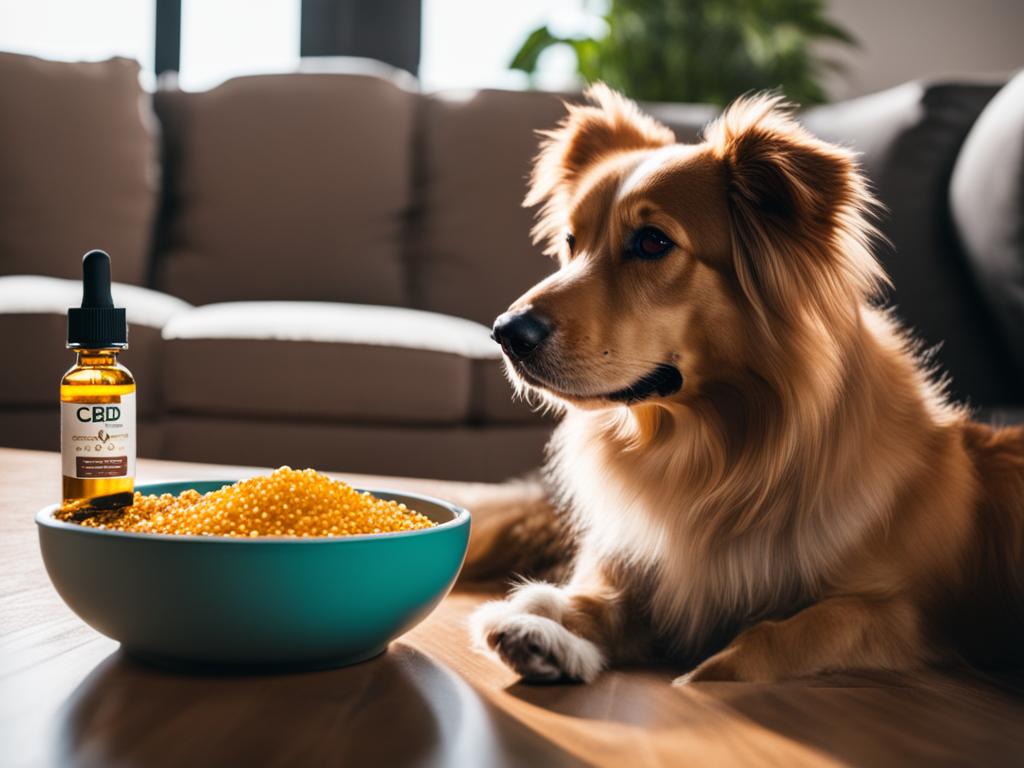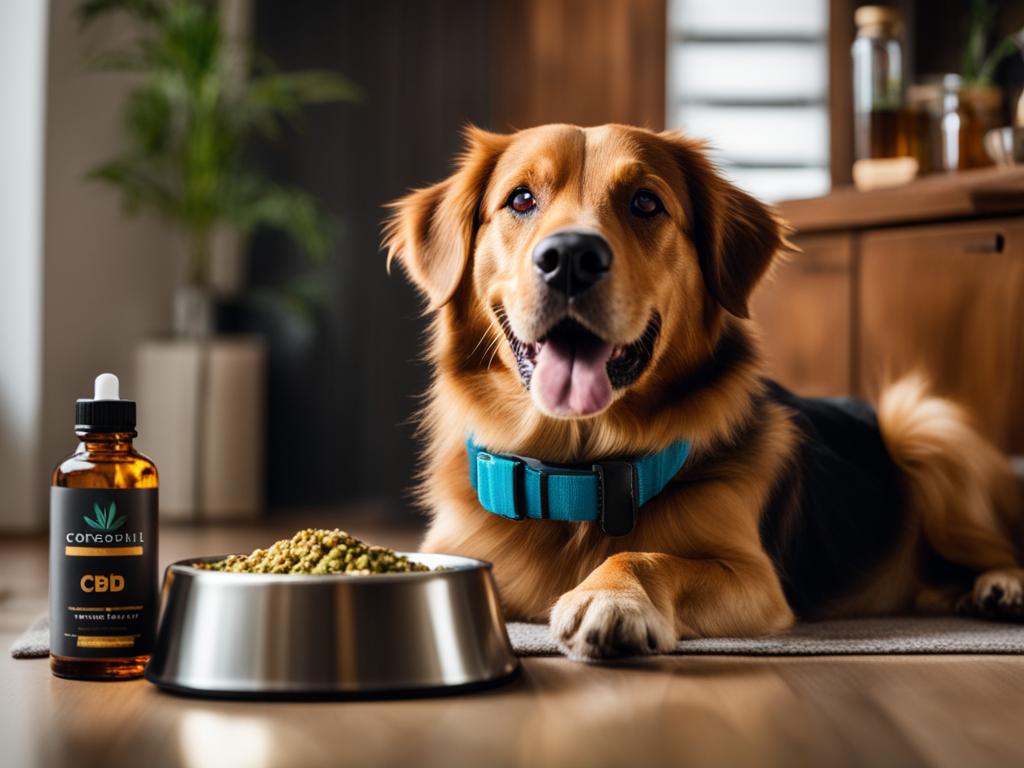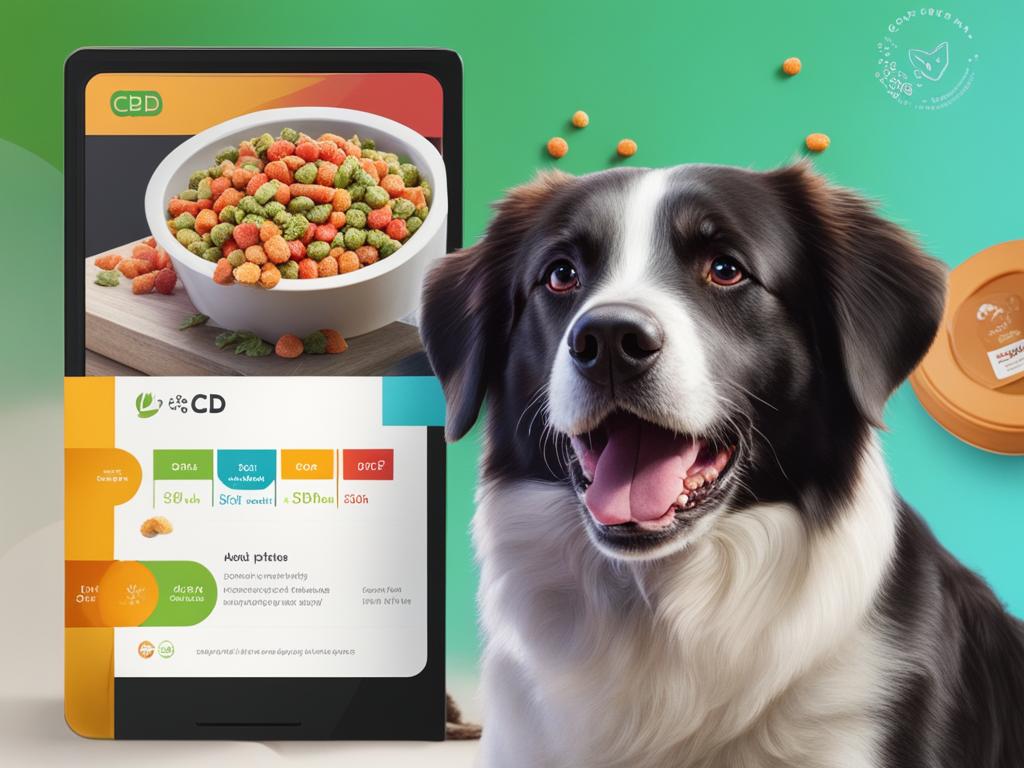We all want our furry friends to have a healthy appetite and enjoy their meals. However, there are times when pets may experience a decrease in appetite due to various reasons such as stress, joint discomfort, or stomach issues. Fortunately, there is a natural solution that can help stimulate your pet’s appetite – CBD.
CBD, or cannabidiol, has gained popularity in recent years for its potential health benefits in both humans and pets. Many pet owners have discovered that incorporating CBD into their pet’s daily routine can be an effective way to improve their appetite and overall well-being.
CBD can promote feelings of calm and ease, making it beneficial for pets who may have lost their appetite due to stress or sadness. Additionally, CBD can help ease joint stiffness and discomfort, allowing pets to enjoy their meals and daily activities without discomfort. It also aids in healthy digestion, addressing any stomach issues that may be contributing to the decrease in appetite.
There are various CBD products available for pets, including CBD oil, treats, and supplements. These products can be easily incorporated into your pet’s routine to enhance their appetite naturally and support their overall health and well-being.
Key Takeaways:
- CBD can be a natural appetite stimulant for pets, helping to improve their appetite.
- It promotes feelings of calm and ease, which can alleviate stress and anxiety that may contribute to a decreased appetite.
- CBD can help ease joint stiffness and discomfort, allowing pets to enjoy their meals and daily activities comfortably.
- It aids in healthy digestion, addressing any stomach issues that may be impacting appetite.
- There are various CBD products available for pets, including oil, treats, and supplements, making it easy to incorporate into your pet’s routine.
Common Reasons for Decreased Appetite in Dogs
Dogs, just like humans, can experience a decrease in appetite for various reasons. Understanding these common causes can help you address the issue effectively and support your furry friend’s overall well-being.
Sadness and Stress
Dogs are emotional beings, and just like humans, they can experience sadness and stress. These emotions can cause a dog to become “shut down” and uninterested in food, resulting in a decreased appetite. It’s important to provide a comforting and stress-free environment for your dog to help stimulate their appetite.
Joint Discomfort
Joint discomfort can make eating and playing uncomfortable for dogs, leading to a loss of appetite. If you notice that your dog is reluctant to move or shows signs of stiffness, joint issues may be the cause of their decreased appetite. Consult with your veterinarian to explore options for managing joint discomfort and improving your dog’s appetite.
Stomach Discomfort
Stomach discomfort, such as difficulty digesting food or experiencing unusual bowel movements, can also contribute to a decrease in appetite. If your dog is showing signs of stomach discomfort, it’s crucial to identify and address the underlying cause. A change in diet or the introduction of new food may also impact their appetite.
Bad Food or Illness
Feeding your dog bad or expired food can decrease their interest in eating. Additionally, illness or medication can have an impact on a dog’s appetite. If your dog’s decreased appetite persists or is accompanied by other concerning symptoms, it’s important to seek veterinary advice to rule out any underlying health issues.
By understanding these common reasons for decreased appetite in dogs, you can take appropriate steps to address the issue and help your furry friend regain their healthy appetite. Remember, if you have any concerns about your dog’s appetite or overall health, consult with a veterinarian for guidance and support.
How to Stimulate a Dog’s Appetite
If your dog is experiencing a decreased appetite or has completely lost interest in food, there are several steps you can take to help stimulate their appetite and ensure they are getting the nutrition they need. Here are some suggestions:
Offer a Bland Diet
Feeding your dog a bland diet of unflavored, boiled chicken with white rice can be helpful in stimulating their appetite. This combination is gentle on the stomach and easily digestible, making it enticing for dogs who may have stomach discomfort or digestive issues.
Incorporate CBD into Their Diet
CBD has been found to be a natural appetite stimulant for pets. Consider incorporating CBD oil or treats into your dog’s daily routine to address any underlying causes of appetite loss. CBD promotes feelings of calm and ease, eases joint stiffness, and aids in healthy digestion, all of which can contribute to improved appetite.
Enhance Meals with Warm Water or Broth
Adding warm water or unsalted chicken broth to your dog’s kibble can enhance the smell and entice them to eat. The aroma of the warm liquid can make the food more appealing and increase their interest in eating. This can be particularly useful for dogs who have a decreased appetite due to illness or medication.
Feed Smaller, More Frequent Meals
Offering smaller, more frequent meals throughout the day can be beneficial for dogs with a decreased appetite. This approach ensures they are getting enough calories and nutrients without overwhelming their stomach. It can also help maintain their energy levels and prevent them from feeling too full or bloated.
Establish a Regular Feeding Schedule
Creating a consistent feeding schedule can help regulate your dog’s appetite and encourage them to eat at regular intervals. Dogs thrive on routine, so feeding them at the same time each day can help stimulate their appetite and make mealtime more enjoyable.
Gradually Reintroduce Preferred Diet
If you recently changed your dog’s diet or introduced new food and noticed a decrease in their appetite, consider gradually reintroducing their preferred diet. Start by mixing a small amount of their regular food with the new food and gradually increase the ratio over time. This can help them adjust to the new food and regain their interest in eating.
Consult a Veterinarian
If your dog’s appetite does not improve within a few days or you have concerns about their overall health, it is important to consult a veterinarian. They can evaluate your dog’s specific situation, provide guidance on how to stimulate their appetite, and ensure there are no underlying medical conditions contributing to the decreased appetite.

| Benefits of Stimulating a Dog’s Appetite | Ways to Stimulate a Dog’s Appetite |
|---|---|
| 1. Ensure proper nutrition for overall health | 1. Offer a bland diet of chicken and rice |
| 2. Maintain a healthy weight | 2. Incorporate CBD into their diet |
| 3. Support energy levels and vitality | 3. Enhance meals with warm water or broth |
| 4. Address underlying health issues | 4. Feed smaller, more frequent meals |
| 5. Improve digestion and nutrient absorption | 5. Establish a regular feeding schedule |
| 6. Promote overall well-being and happiness | 6. Gradually reintroduce preferred diet |
The Role of CBD in Stimulating Pet Appetite
Pets, like humans, can experience a decrease in appetite for various reasons. However, CBD has emerged as a potential natural appetite stimulant for pets, offering a promising solution to help improve their appetite and overall well-being. CBD, or cannabidiol, is a non-psychoactive compound found in the cannabis plant that has been shown to have a range of therapeutic benefits for both humans and animals.
When it comes to stimulating pet appetite, CBD plays a multifaceted role. Firstly, CBD can help alleviate stress and anxiety in pets, which are common causes of decreased appetite. By promoting feelings of calm and ease, CBD can help pets relax and regain their interest in food. Additionally, CBD has anti-inflammatory properties that can help ease joint stiffness and discomfort, making eating and playing more comfortable for pets.
Furthermore, CBD can aid in healthy digestion and support a healthy bowel. Digestive issues, such as difficulty digesting food or experiencing unusual bowel movements, can lead to a loss of appetite in pets. CBD can help regulate digestion and promote a healthy gastrointestinal system, which can in turn improve appetite. By addressing the underlying causes of appetite loss, CBD acts as a natural appetite stimulant for pets.
CBD in Comparison with Other Methods
In comparison to other appetite stimulants for pets, such as medications or supplements, CBD offers a natural and holistic approach. Many traditional medications can have unwanted side effects or may not suit all pets. CBD, on the other hand, is generally well-tolerated by pets and has minimal side effects when administered in appropriate doses. CBD is also non-addictive, making it a safe long-term solution for appetite stimulation.
| Appetite Stimulant Method | Benefits | Potential Side Effects |
|---|---|---|
| CBD |
|
Minimal side effects reported |
| Medications |
|
|
| Supplements |
|
|
“CBD has been a game-changer for my dog’s appetite. She had been experiencing a decrease in appetite due to stress, and it was getting worrisome. I started giving her CBD treats, and within a few days, she was back to her normal self, eagerly eating her meals. CBD is truly a natural miracle worker!” – Pet owner testimonial
It’s important to note that while CBD can be an effective appetite stimulant for pets, it is not a substitute for proper veterinary care. If your pet is experiencing a prolonged decrease in appetite or has any underlying health conditions, it’s always best to consult with a veterinarian to determine the underlying cause and develop an appropriate treatment plan.
Incorporating CBD Into Your Pet’s Routine
When it comes to incorporating CBD into your pet’s routine, there are several options available to suit their preferences and needs. CBD for pets comes in various forms, including chews, oil, and balms, providing flexibility in how it can be administered.
One popular option is CBD chews, which are often flavored and can be a convenient and tasty way to introduce CBD into your pet’s diet. These chews not only provide potential appetite enhancement but also serve as a nutritious treat.
CBD oil is another versatile option. It can be administered by drizzling it over your pet’s food or by applying it directly to their gums or ears for faster absorption into the bloodstream. This method allows for precise dosage control and can be tailored to your pet’s specific needs.
If your pet requires targeted relief, CBD balms can be a valuable addition to their routine. These topicals can be applied directly to specific areas of discomfort or dryness, providing localized support while potentially stimulating their appetite.
When incorporating CBD into your pet’s routine:
- Follow the recommended dosing instructions provided by the product manufacturer.
- Consult with a veterinarian to ensure the proper dosage and safety for your pet.
- Monitor your pet’s behavior and appetite closely to gauge the effectiveness of the CBD.

Table: Comparing CBD Product Options
| Product | Administration | Benefits |
|---|---|---|
| CBD Chews | Oral consumption | Convenient, tasty, and may serve as a treat |
| CBD Oil | Topical or oral administration | Precise dosage control and customizable to pet’s needs |
| CBD Balms | Topical application | Targeted relief for specific areas of discomfort |
Remember, each pet is unique, and their response to CBD may vary. It’s important to be patient and consistent in providing the appropriate dosage and form of CBD for optimal appetite enhancement. If you have any concerns or questions, don’t hesitate to consult with a veterinarian for guidance.
When to Expect Improvement in Pet Appetite
When incorporating CBD into your pet’s routine to stimulate their appetite, it’s important to understand that the timeframe for improvement can vary. Several factors, such as the method of delivery and your pet’s individual response to CBD, can influence how quickly you see results.
The effectiveness of CBD balms and chews may take longer to manifest compared to CBD oil. This is because balms and chews require more time to be absorbed and processed by your pet’s body. On the other hand, CBD oil can be administered sublingually or added to their food for faster absorption into the bloodstream.
To maximize the appetite-stimulating effects of CBD, it is advisable to give it to your pet before their scheduled mealtime. By doing so, you can help stimulate their appetite and enhance their enjoyment of their regular meals.
It’s important to closely monitor your pet’s behavior and appetite throughout the process. If you have concerns about their progress or if their appetite does not improve after a reasonable period of time, it is recommended to consult with a veterinarian. Remember, each pet is unique, and their response to CBD may vary, so patience and consistency are key in finding the optimal dosage and form of CBD for appetite enhancement.
FAQ
Can CBD stimulate a pet’s appetite?
Yes, CBD can be a natural appetite stimulant for pets, including dogs. Many pet owners have found that incorporating CBD treats or other CBD products into their pet’s daily routine can help stimulate their appetite.
What are the common reasons for decreased appetite in dogs?
Dogs may experience a decrease in appetite due to various reasons, such as sadness and stress, joint discomfort, stomach discomfort, bad food, new food, illness, or medication.
How can I stimulate my dog’s appetite?
You can try feeding your dog a bland diet of unflavored, boiled chicken with white rice, incorporating CBD into their diet, adding warm water or unsalted chicken broth to their kibble, feeding them by hand, establishing a regular feeding schedule, and gradually reintroducing their preferred diet if it has recently been changed.
What role does CBD play in stimulating pet appetite?
CBD promotes feelings of calm and ease, eases joint stiffness and discomfort, and aids in healthy digestion, all of which can contribute to improved appetite in pets.
How can I incorporate CBD into my pet’s routine?
CBD for pets is available in various forms, including chews, oil, and balms. CBD chews are often flavored and can be a convenient and tasty option for pets. CBD oil can be administered by drizzling it over their food or applying it directly to their gums or ears. CBD balms can be used topically for specific areas of discomfort or dryness.
When can I expect to see improvement in my pet’s appetite after using CBD?
The time it takes for CBD to improve a pet’s appetite can vary depending on various factors, including the method of delivery and the individual pet’s response to CBD. It is recommended to give CBD to pets before their scheduled mealtime to stimulate their appetite. Pet owners should monitor their pet’s behavior and appetite closely and consult with a veterinarian if there are any concerns or if their pet’s appetite does not improve after a reasonable period of time.
Author Profile

Latest entries
 BlogFebruary 20, 2024I Just Found the Ultimate Clog-Free Vape Cartridge! (Yes, They Exist!)
BlogFebruary 20, 2024I Just Found the Ultimate Clog-Free Vape Cartridge! (Yes, They Exist!) BlogJanuary 16, 2024In the Clouds with Creativity: A Blunt Encounter with Montreal’s Fluid Art Maestro
BlogJanuary 16, 2024In the Clouds with Creativity: A Blunt Encounter with Montreal’s Fluid Art Maestro BlogDecember 25, 2023Sativa: Enhancing Outdoor Adventures
BlogDecember 25, 2023Sativa: Enhancing Outdoor Adventures BlogDecember 25, 2023Enhancing Memory with Sativa
BlogDecember 25, 2023Enhancing Memory with Sativa





